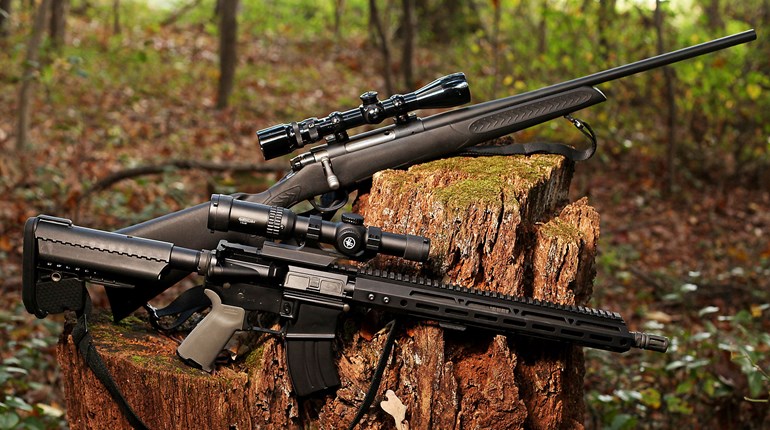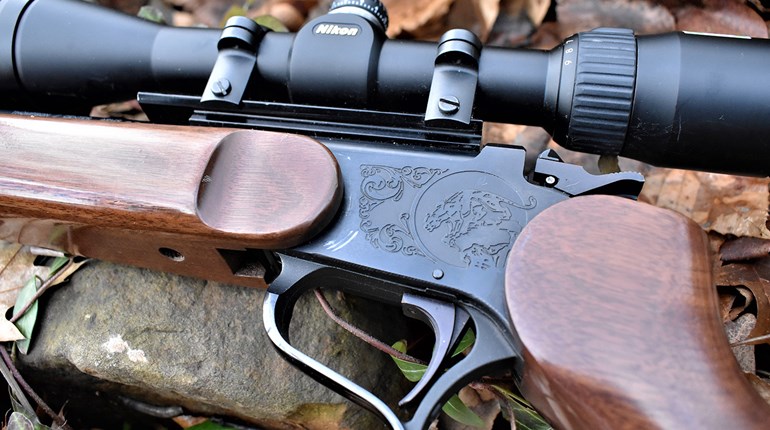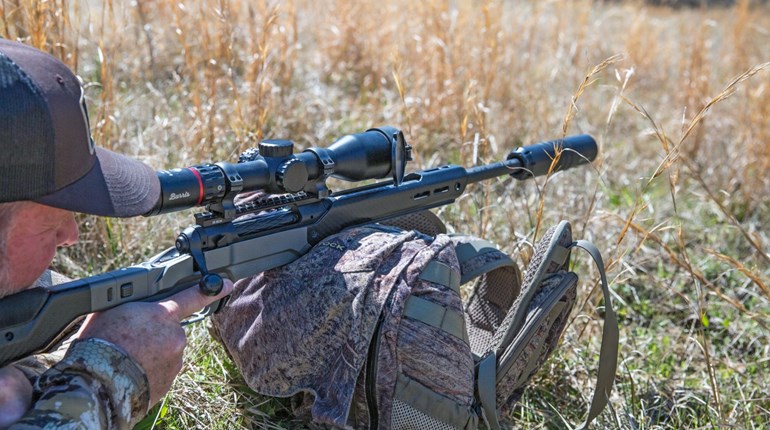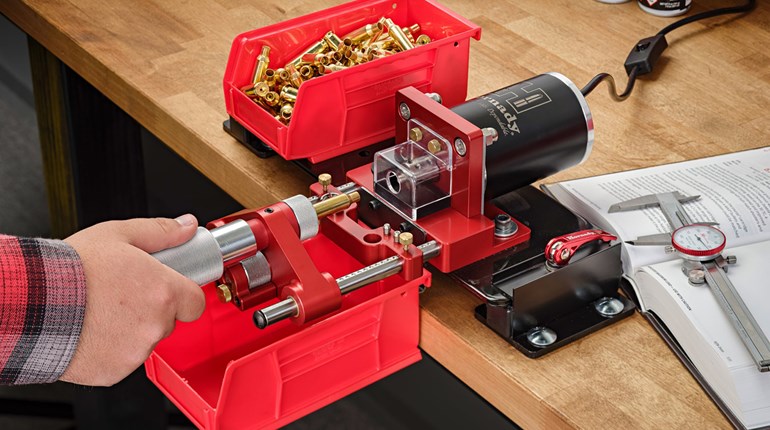
Predator hunting used to be a part of an overall genre called varmint hunting. But as it usually happens, devotees of a specific genre within an umbrella group break away and form their own stand-alone group, or in this case, hunting discipline. Varmint hunting used to be hot .22-caliber—or occasionally .25- and 6 mm-caliber—cartridges chambered in heavy, bull barrels with stiffened actions nestled into equally heavy stocks. Given the manufacturing capabilities of the day, adding mass was the easiest and cheapest way to enhance accuracy.
Times change—or, more accurately, evolve—and the needs of specific shooting environments evolve as well. We still see heavy varmint rifles on a stand in target-rich prairie dog fields where a short shot may be 250 yards, and the shooter may well engage targets as far away as he can see them. However, the predator—or fur—hunter usually needs to be mobile, and packing along a 12- to15-pound rifle isn’t practical. Even traditional vermin busters appreciate ease of portability, provided accuracy doesn’t suffer.
This is the exact scenario I faced last summer on a vermin shoot on the Silver Spur Ranch near Encampment, Wyo. A bunch of us writer types made the trip to the ranch along the Platte River to shoot prairie dogs and picket pins (ground squirrels). One afternoon I took a Thompson/Center Predator Venture in .22-250 Rem. with me. Most of the shooting had been for picket pins, as the extremely cold and wet spring had an adverse impact on prairie dog numbers. At one set up over an alfalfa field, the shooting was pretty steady for a couple of hours. About half way into that stand I saw a fat prairie dog next to a round hay bale. I estimated—because I had forgotten my rangefinder—the pasture poodle at about 300 yards. With the green fiber-optic dot on the Trijicon 5x20x50 mm riflescope on the throat of the rodent I squeezed the trigger. The wet plop sound and the spinning rodent in the air proved the shot was on the mark.
The Venture platform came out about three years ago as a follow-up to the company’s first repeater, the Icon. A year later the Predator version was brought to the marketplace. Like the Icon, the Venture is built on a fairly heavy—meaning stiff—cylindrical receiver with a three-lug, 60-degree-lift bolt. It features a user-adjustable trigger with a range of 3 1/2 to 5 pounds. A factory-supplied tool is used to adjust the trigger. The receiver and barrel are dipped in a Realtree MAX-1 camo pattern, as is the Weather Shield stock. A Realtree APS (All Purpose Snow) camo pattern is available for winter hunters. The stock features Hogue rubber grip inserts, as well as a recoil pad for additional traction and comfort.
A composite, three-shot, single-column, detachable magazine feeds the Venture. The Predator has a 22-inch sporter-weight barrel measuring 1.2 inches at the breech and .678 inch at the muzzle. About 10 1/2 inches of the forward portion of the barrel is lightly fluted, shaving perhaps an ounce of its weight. The barrel has T/C’s 5R rifling, which has lands and grooves opposite of each other, contrasting with traditional six-groove rifling, which has lands opposite lands. The 5R rifling lands are cut with a 65-degree slope instead of the normal 90 degrees. The claim is that this form of rifling cuts and distorts the bullet less than six-groove rifling, thereby increasing accuracy. With less fouling, it also makes it easier to clean the barrel. The barrel is sans open sights, as is the current custom, but it is equipped with Weaver-style bases for scope mounting.
The bolt follows modern design parameters, being full diameter, with three lugs set apart by 60 degrees. A quick check by smoking the lugs with a candle showed all three lugs were fully engaging. The extractor is of the hook type, set into the right lug. A plunger-style ejector is pinned into the top lug. On the bottom of the bolt is a large gas port to vent gases from a pierced primer or broken case into the magazine well. A washer-style recoil lug transfers recoil energy to the stock without movement.
Verifying the sub-moa claim was something of a challenge—not because the rifle didn’t perform, but because I had a heck of a time getting a day when the wind wasn’t blowing 30 mph or more. I tried on five different days to get to the range when the wind seemed to be calm, and every day I fired perhaps two groups before the wind kicked up and blew the little .22-caliber bullets into an improved cylinder shotgun pattern.
Hornady’s V-MAX Superformance ammo turned in the best groups, averaging just a hair more than an inch (1.02 inches) for five shots at 100 yards. The sub-moa guarantee is for three-shot groups, and all of the groups had three shots inside an inch. I had some Winchester Supreme ammo with its 35-grain, lead-free Ballistic Tip screaming out the muzzle at 4,167 fps on hand, and it was just a bit larger in average group size at 1.1 inches. Those flyweight bullets can get bumped around if someone sneezes, so take extreme wind problems into consideration when evaluating the groups. You may notice the velocities I got with these loads are a bit less than advertised. Credit that to having a 22-inch barrel on the Venture Predator instead of the 24-inch standard test barrel.
The Venture series of rifles had a recall late last year. Rifles made prior to October 28, 2011, could fire inadvertently due to some sear geometry problems incurred during manufacture. My sample had no such difficulties, and all currently manufactured rifles do not have that problem. Kudos to T/C and its parent company, Smith & Wesson, for taking care of that problem in a timely manner.
Good stuff and bad stuff: I like the trim profile of the Venture Predator. It’s light enough to be portable and handle well, yet it is substantial enough to hold steady in the field for those longer shots. The accuracy claim is real, and any decent shooter with good ammo and little wind should be able to put three into a nickel at 100 yards from the bench. I also appreciate the adjustable trigger, although I did not adjust this sample since I found it acceptable at the factory setting of 4 1/2 pounds. A couple of things gave me pause though. First, the bolt operation was very stiff with ammunition in the rifle. I’m guessing T/C chambers it pretty tight in order to maintain that sub-moa guarantee. Running the bolt vigorously usually got the job done, but on the bench when going slow I had to smack the bolt smartly with the heel of my hand to close it—actually a bit painful. A more rounded bolt knob profile would be welcome. Too, the magazine is pretty closely fitted in the well, and it took some picking with my fingernails to get it free. While I am at it, how about rifle manufacturers supplying at least two magazines with each rifle as pistol manufacturers generally do now? If you have a detachable-magazine rifle, it only makes good sense to have another at the ready.
With an MSRP of $629 and a street price probably in the mid-$500s, T/C has delivered a pretty good value for the dedicated predator hunter or the roving pasture poodle popper. In the larger calibers—7mm-08 Rem. and .308 Win.—it is a viable deer rifle as well.
Model: Venture Predator; www.tcarms.com
Type: Bolt action
Caliber: .204 Rug., 223 Rem., .22-250 Rem. (tested), .243 Win., 7 mm-08 Rem., .308 Win.
Barrel Length: 22”
Magazine: Composite detachable box, three-round capacity
Trigger: Adjustable from 3 1/2 to 5 lbs.; factory set at 4 1/2 lbs.
Rifling: 1:9 to 12, depending upon caliber, 5R type
Sights: None, scope bases included
Safety: Sear block
Stock: Composite
Overall Length: 39 3/4"
Weight: 7 lbs., 2 oz.
Finish: Realtree MAX-1 camo
Accessories: Trigger adjustment tool
Suggested Retail Price: $629

































